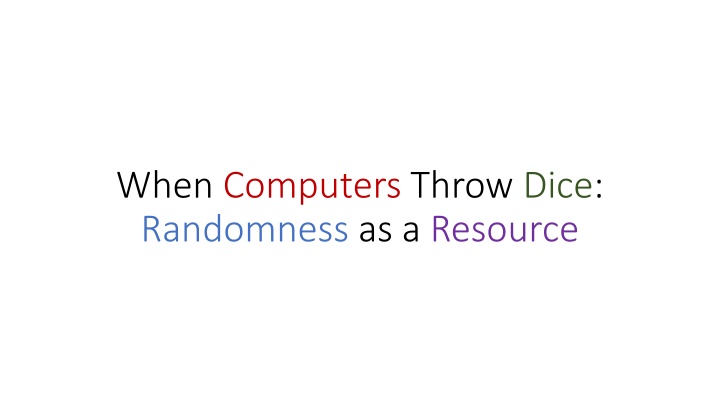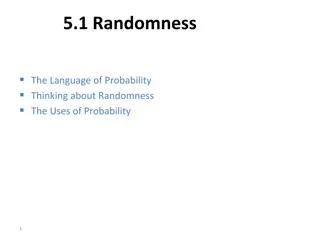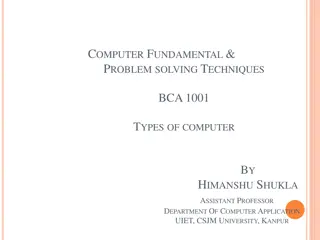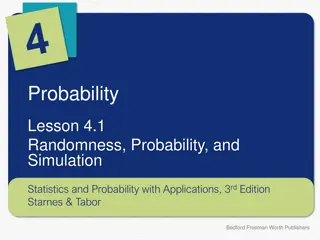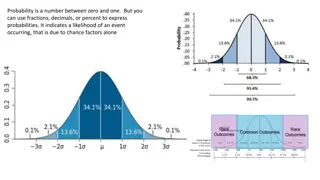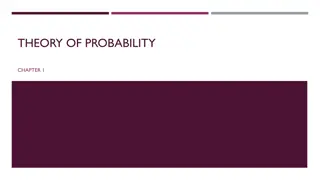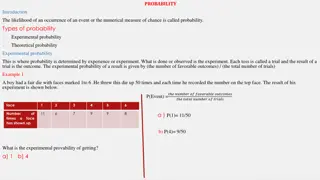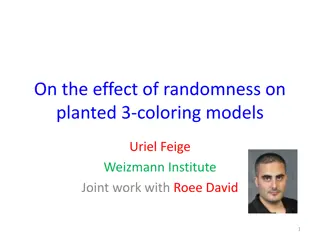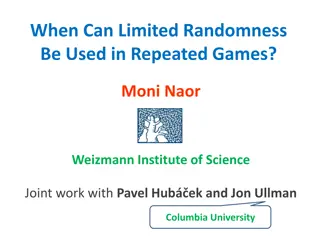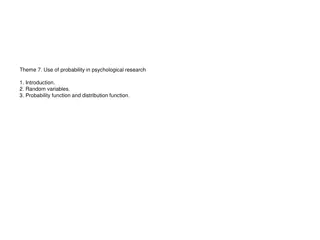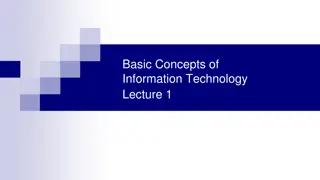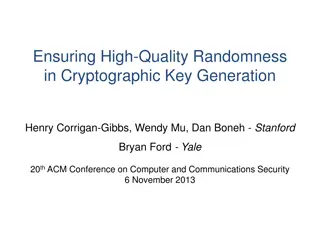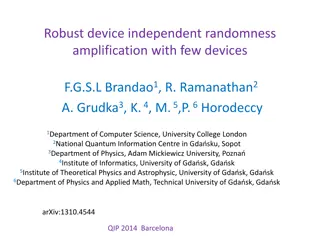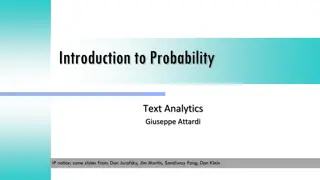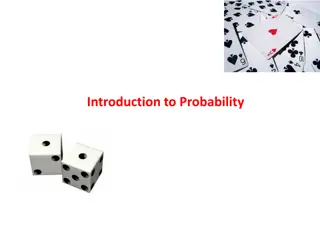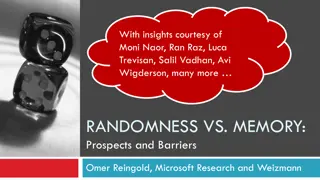Computers and Randomness: Exploring Probability Basics and Analyzing Hot Hand in Game Theory
Delve into the world of computers and randomness through exploring probability basics, analyzing hot hand phenomena, and understanding game theory concepts like the von Neumann game and secret sharing protocols. Discover how different resources in time and space are utilized, and uncover the mysteries of Bernoulli random variables, Markov chains, and the Chernoff bound.
Download Presentation

Please find below an Image/Link to download the presentation.
The content on the website is provided AS IS for your information and personal use only. It may not be sold, licensed, or shared on other websites without obtaining consent from the author.If you encounter any issues during the download, it is possible that the publisher has removed the file from their server.
You are allowed to download the files provided on this website for personal or commercial use, subject to the condition that they are used lawfully. All files are the property of their respective owners.
The content on the website is provided AS IS for your information and personal use only. It may not be sold, licensed, or shared on other websites without obtaining consent from the author.
E N D
Presentation Transcript
When Computers Throw Dice: Randomness as a Resource
Different Resources Time: #steps TM takes Space: #cells TM uses Non-Determinism (P vs NP) RANDOMNESS??????
Probability Basics Bernoulli Random Variable: ? = 1 ?.?. ? 0 ?.?. 1 ? If Independent: Pr[X = x | Y = y] = Pr [X = x] Pr[X = x and Y = y] = Pr[X = x]Pr[Y = y] E[X] = Pr[X=1](1) + Pr[X=0](0) = (p)(1) + (1-p)(0) = p
Our Old Friend Markov ? = ?1+ ?2+ .+?? where ?? is Bernoulli ?[?] = ? ?1+ ?2+ ?? = ? ?1+ ? ?2+ ? ?? = ??= ?? (when all ??= ?) ?=1 ? Markov Inequality: Pr ? ? ? ? ?
Analyzing the Hot Hand Steph has made 95 consecutive free throws Assuming every shot is independent, and curry shoots at 90% What is the probability that curry makes 96th free throw ?? A) (0.9)96 B) (0.9) C) 1 [Curry is GOATED and cannot miss]
The von Nuemann Game Input: Given a biased coin, heads with p, tails with (1-p) Goal: Output a sequence of fair coin tosses
The Chernoff Bound Should Georgetown Replace ChickFila with Panda Express? Idea Polling: Ask a bunch of people Get estimate of probability How far is estimate from True Probability?? How many people should we go and ask
Secret Sharing 5 People find a doge coin out in the wild They want to encrypt the doge coin using a special key, that they can only open only when all 5 people agree What does the banker do? Banker: Generate a key k, and 4 random strings Person 3: r_3 - r_2 Person 1: k + r_1 Person 5: -r_4 Person 2: r_2 - r_1 Person 4: r_4 r_3
Find 1s Open Research Question: Is there a fast randomized alg, that always outputs same answer? Input: Given a string with 50% 1s, 50%0s Output: Output an index with a 1 in it (?) What is the complexity of deterministic algorithm?? What about a randomized algorithm?? Failure Probability:1/2? Pick k random spots, inspect each spot
Generate Prime between [N, 2N] Open Research Question: Always output the same prime Imagine N to be a 200 digit prime Na ve algorithm: Iterate from N -> 2N check if prime [Pseudo-polynomial] Good news: Can check if a given number is prime in poly(#digits) Prime Number Theorem: There are about N/log N primes from [1, .N] Sample approximately 3 log N numbers between [n, 2n] w.h.p you can find a prime
Machine Learning Have a massive dataset Sample small part of the world to train on Algorithm makes predictions based on sample data
Many More Examples Given 3 matrices A, B, and C: Verify AB = C Exact Matching: Find a perfect matching with k-red edges and n-k blue edges PIT: Given a polynomial, output 1 if it always evaluates to zero on all inputs Byzantine Agreement Interesting Questions in practice: How to coordinate randomness when dealing with parallel algorithms?
How do we formalize Randomness as a P: Problems that can be solved in polynomial time NP: Problems whose solution can be verified in polynomial time BPP: Problems that can be solved using randomness in polynomial time with probability > 2/3
Formal Definitions L ??? ? ? There exists a Turing Machine M, with access to random tape r, s.t. There exists a Turing Machine M s.t. ? ? ? ? = 1 w.p 2 ? ? ? ? = 1 w.p. 1 ? ? ? ? = 1 ? ? ? ? = 0 3 3 M(x) runs in polynomial time M(x, r) runs in polynomial time
BPP error amplification Theorem: If there is a language L that has a BPP algorithm with success probability 1 2+ then L has a BPP algorithm with success probability 1 1/22? 1 ?? Run the algorithm ?3? times Return Majority(?1,?2, ,??3?)
BPP in P/poly 1 Let L be a language in BPP decided by a machine M with error Let L use r {0,1}? random bits 2?+1 2? 2?+1 For any x how many possible bad strings: Now take the union over all possible x s: #Bad strings = 2? There are strings ??that are good for all x Hardwire ?? as advice in the circuit 2? 2?+1=2? 2< 2?
BPP vs P Do we really need randomness?
P = BPP If you believe in hard functions, then you should believe that randomness is useless If there is a function that is hard, then we can generate unpredictable bits (coin tosses from that) Construction of PRG (Pseudorandom generator) We are able to simulate randomness deterministically
Giving Computers More Power Samuel Johnson Quote All science is against the freedom of the will; all experience is for it.
